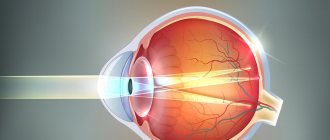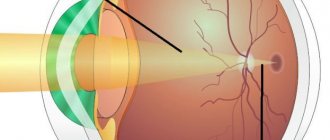Pregnant women, when visiting an ophthalmologist, often ask whether they can undergo laser vision correction in their situation. After all, after such operations, vision does not decrease in the future, and the laser surgery itself cannot affect the course of pregnancy and the success of childbirth. Experts have a unanimous opinion on this matter: of course you can (if you really want to), but why? This operation is not vital and can easily wait, because... the result may be unstable; drops will need to be instilled in the postoperative period. In addition, any surgery is unnecessary stress.
Many people know that one of the limitations of laser vision correction is pregnancy, as well as the period of breastfeeding, but they do not know why.
Why is it not recommended?
The first reason for this is significant changes in hormonal levels in women during the period of bearing and feeding a child. Under the influence of hormones, not only the ligaments of the pelvis soften (preparing to expand it), but also the cornea of the eye becomes more elastic (it consists of the same collagen as the ligaments) and changes its properties. In addition, such changes often lead to certain health problems, including eye health. Therefore, no surgeon can vouch for the stability and predictability of the results of laser vision correction surgery in this category of patients.
Before giving birth, all women must undergo an examination by an ophthalmologist
The second reason is the need to instill special drops in the postoperative period (within 1-2 weeks). The drugs contain antibiotics and a hormonal component (dexamethasone). Although the drops act locally (on the cornea and mucous membrane of the eye), they can partially enter the bloodstream and reach the placenta - therefore, it is better to refrain from using them unless unnecessary.
Is it possible to give birth after laser vision correction?
I understand everything - the shifts are difficult, the patients are meticulous, there are problems in the family, salaries are not paid on time... this is all understandable... I myself have been working at the clinic for seven years (as a surgical assistant), but I have not encountered SUCH indifference for a long time. Let me remind you that I recently lived in Balashikha, I lived from 2002 to January 2014 in Moscow, somehow everything was simpler there, but here everything... somehow... now I need to get used to it)))
the day before yesterday, in the evening, I started having pain in the area of my left ovary. I didn’t even call an ambulance; I got ready and went with my husband to the Balashikha Perinatal Center (it was already 10 pm, so there was nowhere else to go, it was late). I was worried - what if something happened? We are planning a second child, I think I might be pregnant?? What if something’s wrong?) I arrived there and they checked me into the emergency room, took my blood pressure... 60/30, temperature 36.9, I’m pale, I’m staggering, my head is spinning. The pain in the ovary is terrible. From the post at the reception they call the doctor on duty - urgently here, suspicion of apoplexy. I was already thrown up... How?? There is no bleeding... They put me on the couch, they are preparing to draw blood and put on an IV. Then this doctor on duty comes, silently lifts me from the couch, removes the nurse with the catheters and the tripod from me and says: Get on your feet. I get up. Let me remind you, I’m SICK, I’m already crying. She - so what? How do you feel? I tell her how I feel, but I almost fall from dizziness. She: externally (ahem... externally?????????????????????????? I came to gynecologists, I wonder, or to psychics??????? ?????????????????????)… outwardly, he says, you look healthy. Sit on the chair.
She sat down and examined me (without ultrasound, etc.): You don’t have anything, you’re healthy, let me go home. I'm shocked. The receptionist is shocked. He says: “but she has acute pain, blood pressure is 60/30, rate is 36.9.” Doctor on duty: “and I have 2 women giving birth there at the same time.” I wrote out a certificate with recommendations: to have an ultrasound scan done at my place of residence. And she went to the birth block. I crawled into the corridor to my beloved, told it all... he was shocked too) he said, if you get pregnant, we won’t go here to give birth))))) in general, we got home at 12 at night, both of us were emotional, I swallowed it half a pack of pills and went to bed. In the morning it still hurt a little, but not as much as in the evening. Now I feel... strange... I feel dizzy and feel nauseous. It's too early to do the test. The hellish pain has gone away, if only a little. Yes, I don’t mind that the doctor “by eye” determined that I have no problems there))))) but that’s not how it’s done!!!! Moreover, I immediately told her that I could be pregnant, this is already a reason to thoroughly check everything. I didn’t get to the ultrasound today. Weakness(((I’m lying on the bed, I can’t get up...
___
By the way, this year I managed to call an ambulance 3 times already (I have certain health problems, so I have to call them periodically) - that’s super, by the way! All three times arrived very quickly!!! the third time, after 7 minutes the doorbell rang already))) I was really pleased. In Moscow I waited for ambulances for an hour or two.
I was also pleased with how I was “attached” to the clinic at my place of residence)))) except for the queue at the reception (you have to stand in two windows so that you can be brought in everywhere, I spent 2.5 hours on this!!!), otherwise it’s fine All. The doctors are adequate, they are not rude, the therapist is an adult aunt (about 60 years old), with a sense of humor, a nurse is about 30-35 years old, also with a black background. They accepted me without any problems without an appointment (on the day of registration at the hospital), I urgently needed a voucher to see a neurologist and a referral to a cardiologist and for an x-ray. At the same time, I also went to see an ophthalmologist (for peace of mind)))) three years ago I had laser vision correction, and now I check with ophthalmologists once a year.
Will my vision deteriorate after childbirth?
Research shows that pregnancy and the method of delivery have no effect on the progression of myopia (vision deterioration) in the long term. During pregnancy, vision may change because... the properties of the cornea change (as discussed above), but after the hormonal levels are normalized, the properties of the tissue return to their original state. The same thing happens with vision.
Statistical data from clinical observations of women during pregnancy and childbirth indicate that one of the most serious problems during childbirth is the risk of developing retinal detachment of the eye. This is due to a violation of the structure of the retina - the presence of dystrophies or tears (in this case, vision can be absolutely normal!).
Indeed, during natural childbirth, a woman’s body experiences enormous additional stress, intra-abdominal pressure increases, which indirectly causes stretching of the eyeball - which significantly increases the risk of retinal detachment and ruptures. If this happens, a complex and difficult operation for the patient is necessary - vitrectomy (but this does not guarantee the restoration of the mother’s vision).
That is why a visit to an ophthalmologist is mandatory for all pregnant women without exception. After all, only after a comprehensive examination with dilation of the pupil to examine the retina and fundus of the eye can one assess the existing risks. And if any are identified, take adequate measures to prevent unwanted consequences - strengthen the retina with a laser. This procedure at this stage is much more important for a woman than laser vision correction.
The mechanism of development of retinal detachment during childbirth (if there are dystrophies or tears)
In what cases is natural childbirth prohibited?
There are a lot of reasons, they all have medical justifications. And arguing with doctors to prove your 100% health is pointless. Most often, contraindications are associated with a possible threat to the mother and (or) child. Let's look at the most common ones.
— Diabetes mellitus and similar diseases are the first indicator for childbirth through cesarean section.
— Various pathologies. Deformed reproductive organs, etc.
- First emergency caesarean section due to a serious cause, such as placental abruption.
— Recent surgeries. Is it possible to give birth after eye surgery?
Let's talk about the last point in more detail. More precisely, let's consider eye surgery. There can be a lot of eye diseases, and not all of them can be treated with medication. In many cases, doctors resort to laser vision correction, and in more serious cases, surgery.
Recent eye surgery may well be an indication for a caesarean section. In addition, it is a well-known fact that during pregnancy a number of changes occur in a woman’s body associated with hormonal changes. During this period, cases of deterioration in the condition of teeth and nails, general weakness, exacerbation of chronic diseases, and deterioration of vision are not uncommon. And in the case of eyes that have undergone surgery, it will be very dangerous if a number of alarming symptoms appear. Let's look at these symptoms more closely so that they can be noticed later.
You may be interested in How to preserve a schoolchild’s vision
— Sharp deterioration of vision with pregnancy. The most important point is that it requires immediate contact with your local doctor for further action.
— Periodically, dots and sparks appear before your eyes. Sensation of specks in the eyes.
— The contours of objects began to distort. During pregnancy, glasses or contact lenses began to interfere.
Myopia is a serious disease after which natural childbirth is contraindicated. In the people it is myopia. That is, a condition in which the eye can see something only at a certain, fairly close distance.
Currently, myopia is eliminated or cured using laser vision correction. The procedure itself is less noticeable to the body than surgery. But it's still an operation. It requires its own rehabilitation period and special eye care.
Laser vision correction and natural childbirth
Many women want to undergo laser vision correction because they are sure that severe myopia will not allow them to give birth on their own and will have to undergo a cesarean section. However, this is another misconception. Which way is best for a woman to give birth can only be judged after a complete ophthalmological examination, comparing all the available individual parameters of the patient’s visual system. Indeed, in this case, the greatest interest is not the degree of myopia, but the condition of the fundus. It is interesting, but in patients even with high degrees of myopia there may be a complete absence of pathological changes in the fundus and vice versa: with slight myopia, sometimes a number of problems are revealed in the fundus. This proves that if a woman is diagnosed with myopia, but there are no problems with the retina (breaks and dystrophies), she can give birth on her own. A woman also receives the go-ahead for natural childbirth even in the presence of certain pathologies of the retina, if she has undergone a procedure to strengthen it - laser coagulation.
Elimination of retinal dystrophies and breaks is a guarantee of vision preservation after childbirth
Laser vision correction surgery does not affect the condition of the fundus in any way. And yet, patients are often recommended to undergo laser coagulation of the retina before surgery if some pathological changes are detected in its structure.
Sagonenko Dmitry Alekseevich
Is it possible for nulliparous women to undergo laser correction?
Laser vision correction involves a series of interventions that change the surface of the cornea using a laser beam. It is widely believed that before pregnancy, girls should not undergo vision correction, since during hormonal changes and efforts during childbirth, its results may be impaired, and the cornea will return to its pathological configuration. However, experts refute this belief, urging girls to decide on surgery immediately after reaching adulthood.
The origin of the myth was the fact of frequent ophthalmological complications during childbirth, when all a woman’s systems work to the limit of their capabilities. However, in most cases, such disorders are associated with a high degree of myopia or farsightedness in the presence of a violation of the integrity of the retina - micro-tears, degeneration or other pathologies. Also, modern laser techniques, unlike the first keratotomies, which occurred by making incisions on the cornea, have no restrictions regarding physical activity
in the future and do not create dangerous situations for women during childbirth.
Accordingly, laser exposure to the cornea does not increase the risk of complications during childbirth. Pregnancy after laser vision correction is absolutely safe
. The likelihood of vision deterioration due to excessive physical exertion mainly depends on the characteristics of the compensatory capabilities of the woman’s body.
It is important to understand that before undergoing laser vision correction, each patient undergoes several preoperative consultations. During an appointment with a doctor in a specialized clinic, a thorough examination of all disorders of the visual system takes place.
Even minimal changes in the retina of the eye will be noticeable during instrumental examination methods, and the ophthalmologist will suggest correcting the violations before performing laser correction. In this case, a laser restrictive laser coagulation procedure of the retina is prescribed. Using a laser, the ophthalmic surgeon creates coagulates on the retina in the thinnest places, thereby strengthening it. Thus, the operation is not only safe for nulliparous women, but can also lead to the prevention of complications during childbirth. It has been proven that neither pregnancy nor childbirth will be able to return the cornea to its original state as it was before correction.
Modern laser correction technologies are absolutely safe and allow the procedure to be performed by both women who have given birth and those who have not given birth - such operation options almost completely eliminate tissue heating, act in a targeted manner and minimize the risks of visual impairment in the long term and during pregnancy. The safest and most effective technique to date, Femto Super Lasik, is performed sequentially using two lasers. Not every clinic can boast of such equipment.
Ophthalmologists add that the absence of the need to constantly wear glasses or contact lenses will only simplify the pregnancy period for a woman after laser vision correction, preparation for childbirth and the very process of giving birth to a child.
Laser coagulation
Modern medicine offers preventive laser coagulation to prevent retinal detachment. The essence of coagulation is that weak spots on the retina are “welded” with a laser. Then scars form in these places, and the connection between the retina and the choroid is restored.
This procedure is carried out in a few minutes and does not cause any pain. After this, the eye recovers within one hour. And if there are no repeated changes in the retina, the ophthalmologist issues a conclusion that the patient can give birth on her own.
This procedure can be carried out:
- up to 35 weeks of pregnancy;
- any time before pregnancy.
Independent childbirth is possible for the following indications:
- Moderate and weak myopia;
- Improved stable condition of the retina after laser coagulation;
- Laser vision correction performed before pregnancy;
- High degree of myopia, but without pathologies on the retina.
Vision can change significantly during pregnancy. This manifests itself in increased curvature, decreased sensitivity and thinning of the cornea. Fluid retention causes swelling of the cornea, which in turn can lead to dysfunction of the optic nerve.
Decreased corneal sensitivity leads to decreased tear production and poses a risk of infection and other local damage. These and some other changes may be temporary, but may also last until the end of breastfeeding.
During pregnancy, the course of eye diseases that are associated with damage to the optic nerve, vascular tract, retina, lens and cornea may worsen. Diseases of the retina and optic nerve are among the most severe eye pathologies in pregnant women.
“Floaters” that appear in the field of view are, as a rule, a consequence of vascular changes. This is not always dangerous, but it is worth telling your doctor about it, as sometimes it can be a consequence of retinal pathology.
How long should it take from surgery to pregnancy?
If nulliparous girls have no restrictions regarding laser correction, then the operation is not recommended for pregnant women and women during the feeding period.
There are medical recommendations that are related to the characteristics of the postoperative period:
- After surgery, the risk of infectious damage to the organ of vision increases significantly - the eyes become a vulnerable place and an entry point for pathogenic microorganisms. Mandatory measures during the rehabilitation period include instillation of special medications, such as antibiotics or anti-inflammatory drugs as prescribed by a specialist. Some of them can be toxic to the fetus and are therefore contraindicated during pregnancy.
- Changes in hormonal levels and metabolism during pregnancy may interfere with the intended results of the operation, and complete correction of visual acuity with laser will not occur.
The approximate time period from the moment of microsurgical intervention to the onset of pregnancy is at least six months. During this time, all postoperative measures will be successfully carried out, and the body will return to normal after stress and prepare for the test in the delivery room.
Is it possible to give birth after eye surgery?
If doctors doubt the advisability of a natural birth, then in 90% of cases a planned operation will be prescribed. If there is an indication for an independent, natural procedure, then they will inform you about it. In any case, ultimately the choice is up to the expectant mother and her doctor.
As for the eye surgery, even after 3 or 5 years, there are still certain risks during childbirth. For example, an increase in ocular or intracranial pressure, because natural childbirth is, first of all, tension, and the maximum for a particular case.
You may be interested in Cosmetic Eye Surgery: Popular Questions
Therefore, to summarize, it is worth noting that the greatest influence is the opinion of the doctor who takes responsibility. If there is a real chance of spontaneous childbirth, the specialist will never insist on surgery, and vice versa.










